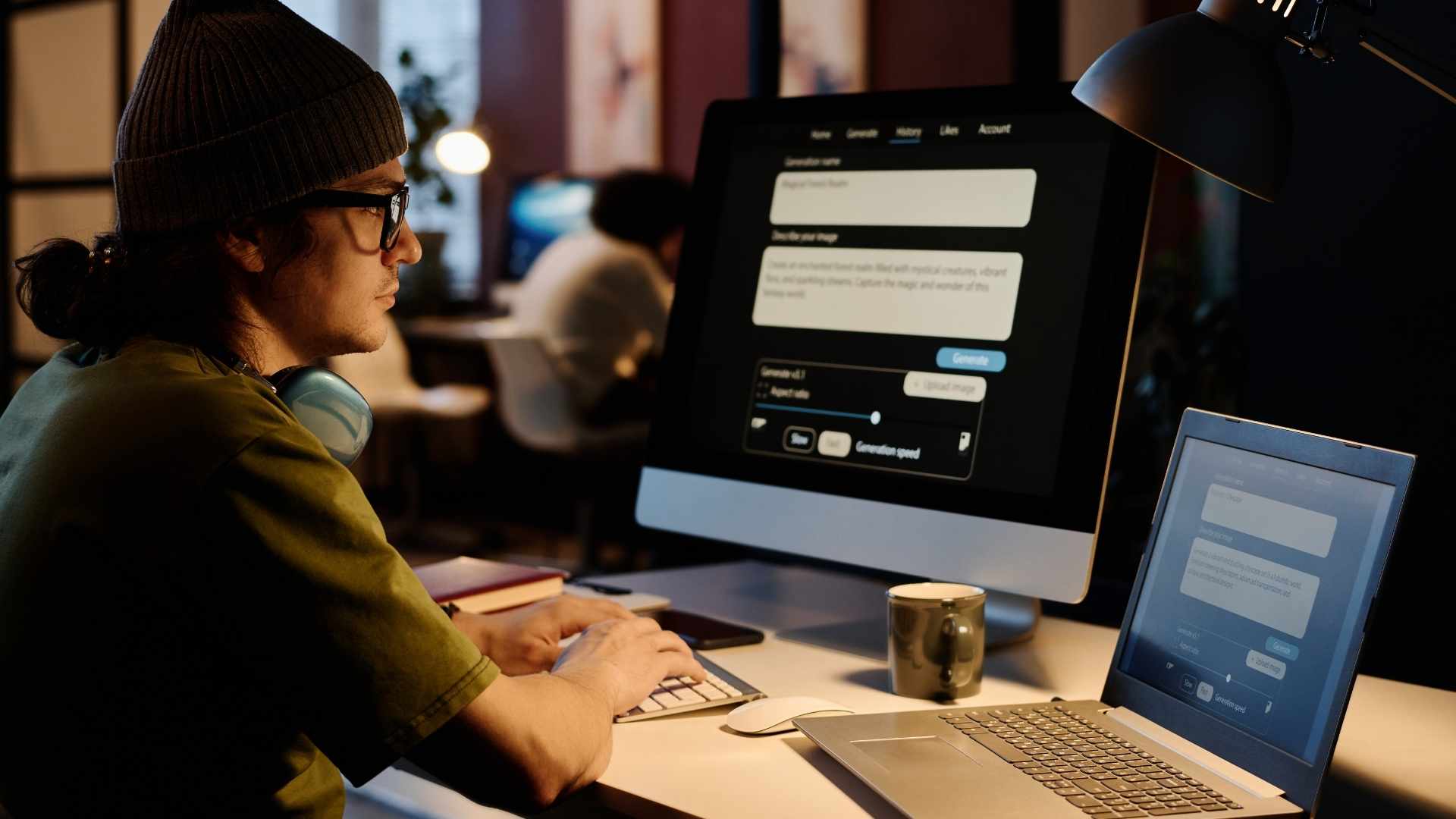Everyone argues agency versus in-house. After 15 years building marketing teams, the better answer is hybrid: internal spine plus specialist pods plus shared scorecard. Here’s the math to compare all three models and the 90-day plan to get moving.
Most companies debate agency versus in-house marketing, but the smartest operators build hybrid teams. A typical hybrid includes 1-2 strategic internal hires ($90K-120K base, $121.5K-162K loaded) who own strategy and execution oversight, plus 2-3 specialist retainers ($5K-12K/month each) for channels requiring deep expertise like SEO, paid media, or content production. In our analysis, hybrid is typically 5-20% lower 3-year TCO than building an equivalent in-house specialist team, and delivers results 30-60% faster than staffing entirely internal. The key is treating your internal hires as governance owners who oversee agency work, not as full execution teams. This structure scales efficiently, covers specialist gaps, and maintains institutional knowledge. These are the three factors pure agency or pure in-house teams struggle to balance.
Why the binary choice fails
Most articles compare agency versus in-house as if you must choose one. After 15 years building marketing teams, we’ve found the question itself creates problems.
(Spoiler alert: The best answer is usually neither pure option.)
Here’s why.
The pure in-house trap: You hire a marketing manager for $80K. Seems reasonable. But loaded cost is actually $108K/year (base plus 35% for benefits and tools). And they can’t cover SEO, paid media, content, social, email, and analytics with specialist depth. So you hire another person. Now you need a director to manage them. You’re three hires and 18 months in before anything ships.
The pure agency trap: You hire an agency for $10K/month. They promise full-service coverage. Sounds great. But without a dedicated internal owner spending 10 hours/week governing the work, agencies drift toward what’s easy to report (traffic, impressions) not what drives business (pipeline, revenue). Knowledge stays with them forever.
The overlooked third option: Hybrid combines internal spine (1-2 strategic hires) with specialist pods (2-3 agency retainers). Internal team owns strategy and governance. Agencies bring channel depth. Shared scorecard aligns everyone.
This isn’t theory. It’s pattern recognition from watching companies scale from $5M to $50M+ revenue.

The three models at a glance
Let’s break down how each model actually works in practice.
In-house model:
- Structure: 3-5 full-time employees covering all marketing functions. You build the entire capability internally with specialists for each channel.
- Control: Complete. Marketing reports to you daily. You set priorities, change direction instantly, maintain total oversight.
- Continuity: High. Team builds institutional knowledge over years. They understand your product deeply.
- Specialist Depth: Can be high with right hires. But finding SEO expert who stays current, paid media specialist who knows every platform, content lead who writes and strategizes? That’s 3-4 different people.
- Ramp Time: 6-12 months to full productivity. First 3 months are onboarding. Months 4-6 are learning your market. Months 7-12 they finally hit stride.
- Coverage: Still struggles with edge cases. PR crises, complex algorithm changes, high-end video production often require outside help anyway.
- Best for: Companies at $50M+ revenue that can support 5+ person teams with truly specialized roles.
Agency model:
- Structure: External team on monthly retainer covering agreed channels. You outsource execution entirely.
- Speed: Fast. Specialists start immediately. They’ve done this before for similar companies.
- Depth: High. Access to experts across all channels. Senior strategists, junior executors, specialized tools all included.
- Governance Overhead: Requires a dedicated internal owner for 10+ hours/week. Someone needs to review work, provide feedback, ensure alignment.
- Drift Risk: High if no internal oversight with shared KPIs. Agencies optimize for renewal, not necessarily your growth.
- Knowledge Retention: Low. Expertise stays with agency. If they leave, you start over.
- Best for: Pre-$5M revenue companies without budget for full-time marketing, or companies with strong internal marketing leader who can govern effectively. (The key word there is “strong.” Governance takes confidence.)
Hybrid model:
- Structure: 1-2 internal strategic hires plus 2-3 specialist agency retainers. Best of both worlds approach.
- How It Works: Internal spine owns strategy, roadmap, brand voice. Agencies bring channel expertise for SEO, paid media, content production.
- Governance: Built in. Internal team owns the governance function. They review all work, maintain standards, ensure integration.
- Knowledge: Shared. Internal team learns from agencies. Agencies understand business deeply. Knowledge transfer happens naturally.
- Shared Scorecard: Everyone optimizes for same metrics. Pipeline and revenue, not vanity metrics like impressions or traffic.
- Ramp Time: 60-90 days to full productivity. Internal hire provides continuity while agencies spin up quickly.
- Best for: $5M-$50M revenue companies wanting results faster than pure in-house but with more control than pure agency.
The real math: formulas you can actually use
Here are the exact formulas we use internally to evaluate team structure options. Steal them.
(We’re sharing our actual evaluation framework here. Most agencies would charge for this. But we believe in education over gatekeeping.)
Formula 1: The implied hourly rate calculator
Implied Rate = Monthly Retainer ÷ Monthly Hands-On Hours
Example: $8,000 retainer ÷ 40 hands-on hours = $200/hour
This reveals what you’re actually paying per hour of agency work. Most agencies won’t disclose hands-on hours in proposals. Push for this number.
Without it, you can’t compare quotes meaningfully. An $8K retainer with 60 hands-on hours ($133/hr) beats a $6K retainer with 20 hands-on hours ($300/hr), even though the headline number looks cheaper.
Rule of thumb: If hours aren’t disclosed, model 30-40 hrs for an $8K-$10K retainer (≈ $200-$333/hr). Ask what justifies rates >$250/hr. Below $100/hr usually signals juniors or heavy outsourcing.
Formula 2: True cost of in-house
Loaded Salary = Base + 25% (benefits) + 10% (tools/training)
Example:
Base: $90,000
Benefits (25%): $22,500
Tools/Training (10%): $9,000
Total loaded cost: $121,500/year or $10,125/month
That $90K marketing manager actually costs $121,500/year when fully loaded. Most founders and executives underestimate total cost by 35% when they only budget base salary.
Budget for reality, not just base salary. This is why two $90K hires don’t cost $180K. They cost $243K when fully loaded.
Formula 3: Break-even calculation for hybrid
Break-Even Months = (One-Time Build Cost + Ramp Period Costs) ÷ Monthly Efficiency Gain
Example:
One-time: $15K (hiring, onboarding, tool setup)
3-month ramp: $18K (reduced productivity)
Monthly gain: $3K (hybrid saves vs pure in-house)
Break-even: ($15K + $18K) ÷ $3K = 11 months
Most hybrid models break even in 8-15 months. After that, you’re saving money monthly while maintaining better specialist coverage than pure in-house. The upfront investment creates long-term advantage.


The 36-month investment analysis
Let’s look at real costs across three common scenarios.
Assumptions used across all scenarios
- Raises: 5%/year
- Benefits: 25% of base salary
- Tools/training: 10% of base salary
- Agency year-over-year increase: 4% (retainers only, not governance)
- Productive working hours: 1,600/year
- Agency hands-on hours for $8K-$10K: 30-40 hrs/month
- Turnover recruiting/backfill cost: $15K average per event
- Expected turnover events: ~1 per 3-4 full-time employees over 3 years
Scenario A: Lean hybrid ($5M-$15M revenue, equivalent coverage)
Hybrid model:
- 1 internal marketing manager: $90K base → $121.5K loaded
- 2 specialist retainers (SEO, paid): $8K/mo each → $192K/year
- Year 1: $313.5K
- Year 2: $325K (5% raise internal, 4% increase agencies)
- Year 3: $337K
- 3-year total: $975.5K
Pure in-house (equivalent coverage = strategy + SEO + paid + content):
- Marketing manager: $90K base → $121.5K loaded
- SEO specialist: $85K base → $114.8K loaded
- Paid media specialist: $90K base → $121.5K loaded
- Content lead: $80K base → $108.0K loaded
- Year 1: $465.8K
- Year 2: $489.1K (5% raises)
- Year 3: $513.5K
- Turnover buffer: $15K avg recruiting/backfill × 1 expected event (4 employees) = $15K over 3 years
- 3-year total: ≈$1.48M
Pure agency:
- Retainers to cover SEO + paid + content production: $20K/mo → $240K/year
- Internal governance (10 hrs/wk @ $150/hr, 50 wks): $75K/year
- Year 1: $315K ($240K + $75K)
- Year 2: $324.6K ($249.6K retainers + $75K governance)
- Year 3: $334.6K ($259.6K retainers + $75K governance)
- 3-year total: $974.2K
Lean reality:
Hybrid vs in-house: ~35% lower 3-year TCO with equivalent coverage. Hybrid vs agency: Within 1% of pure agency cost, but hybrid retains institutional knowledge and control.
Scenario B: Growth hybrid ($15M-$35M revenue, equivalent coverage)
Hybrid model:
- 1 senior marketing manager: $110K base → $148.5K loaded
- 3 specialist retainers: $10K/mo each → $360K/year
- Year 1: $508.5K
- Year 2: $530.3K
- Year 3: $553.2K
- 3-year total: $1.59M
Pure in-house (equivalent coverage):
- Marketing director: $130K base → $175.5K loaded
- SEO specialist: $95K base → $128.3K loaded
- Paid specialist: $100K base → $135K loaded
- Content lead: $90K base → $121.5K loaded
- Email specialist: $85K base → $114.8K loaded
- Year 1: $675.1K
- Year 2: $708.9K
- Year 3: $744.3K
- Turnover buffer: $15K avg recruiting/backfill × 1.5 expected events (5 employees) = $23K over 3 years
- 3-year total: ≈$2.15M
Pure agency:
- Agency retainers: $28K/mo → $336K/year
- Governance overhead: $90K/year (senior person at 12 hrs/week)
- Year 1: $426K ($336K + $90K)
- Year 2: $439.4K ($349.4K retainers + $90K governance)
- Year 3: $453.4K ($363.4K retainers + $90K governance)
- 3-year total: $1.32M
Growth reality:
Hybrid vs in-house: ~27% lower 3-year TCO with equivalent specialist depth. Hybrid vs agency: ~20% higher than pure agency, but maintains control and knowledge.
Scenario C: Scale hybrid ($35M+ revenue, equivalent coverage)
Hybrid model:
- 1 marketing director: $130K base → $175.5K loaded
- 1 marketing manager: $95K base → $128.3K loaded
- 3 specialist retainers: $12K/mo each → $432K/year
- Year 1: $735.8K
- Year 2: $767.2K
- Year 3: $800.1K
- 3-year total: $2.30M
Pure in-house (full team):
- Marketing director: $130K → $175.5K loaded
- 2 marketing managers: $95K each → $256.5K loaded total
- 4 specialists: $90K avg → $486K loaded total
- Year 1: $918K
- Year 2: $963.9K
- Year 3: $1.01M
- Turnover buffer: $15K avg recruiting/backfill × 2 expected events (7 employees) = $30K over 3 years
- 3-year total: ≈$2.92M
Pure agency:
- Agency retainers: $40K/mo → $480K/year
- Governance: $110K/year (director at 15 hrs/week)
- Year 1: $590K ($480K + $110K)
- Year 2: $609.2K ($499.2K retainers + $110K governance)
- Year 3: $629.2K ($519.2K retainers + $110K governance)
- 3-year total: $1.83M
Scale reality:
Hybrid vs in-house: ~23% lower 3-year TCO with equivalent coverage. Hybrid vs agency: ~25% higher than pure agency. At this scale, consider the revenue impact of faster execution.

The revenue impact that flips the decision
Faster ramp is where hybrid pays back. Even when hybrid costs more, the revenue difference often justifies it.
Use this back-of-napkin calculation:
Revenue Lift from Faster Start =
Monthly Net-New Pipeline × Close Rate × Gross Margin × Months Gained
Example:
$150K pipeline/mo × 25% close × 60% margin × 3-month head start = $67,500 profit
Over 6 months of faster ramp: $135,000 additional profit
A 3-6 month head start on revenue generation often dwarfs any cost premium. If your average deal size is $50K with 60% margins, just 2-3 extra closed deals from faster marketing ramp pays for the entire first year difference.
This is why hybrid makes sense even when nominally more expensive. You’re buying time to revenue, not just marketing services.
The weighted decision scorecard
Here’s the framework we use internally to evaluate which model fits. Fill this in for your situation.
| Criterion | Weight | Your Score (1-5) | Weighted Score |
| Speed to value | 20% | ___ | ___ |
| Depth of expertise needed | 15% | ___ | ___ |
| Governance readiness | 10% | ___ | ___ |
| Hiring complexity/market | 10% | ___ | ___ |
| Resilience/capacity needs | 15% | ___ | ___ |
| Institutional knowledge priority | 10% | ___ | ___ |
| Tool access requirements | 10% | ___ | ___ |
| Cost predictability importance | 10% | ___ | ___ |
| TOTAL | 100% | ___ |
Scoring Guide:
- 1 = Very low priority/capability
- 3 = Moderate priority/capability
- 5 = Critical priority/strong capability
Results Interpretation:
- 70+ weighted score in Speed/Expertise/Tools: Start with agency or hybrid
- 70+ weighted score in Governance/Knowledge/Cost: Start with in-house or hybrid
- Balanced scores across categories: Hybrid model recommended
- High in Hiring Complexity or Governance gaps: Start with pure agency, plan hybrid migration
Take 10 minutes and fill this in. Your total weighted score reveals your starting point.
Three worked examples
Example A: Early stage startup ($3M revenue)
- High scores in: Speed to value (5), Tool access (4)
- Low scores in: Hiring complexity (2), Governance readiness (2)
Result: Start with pure agency, plan hybrid migration at $5M
Example B: Growth company ($15M revenue)
- Balanced scores across most categories (3-4 range)
- Strong score in Governance readiness (4)
Result: Hybrid model ideal
Example C: Enterprise ($75M revenue)
- High scores in: Institutional knowledge (5), Governance (5), Hiring (4)
- Lower scores in: Speed to value (2)
Result: In-house with specialist agency support for new channels
Your 90-day hybrid launch plan
Ready to build a hybrid team? Here’s exactly how to do it.
Phase 1: Days 1-30 (foundation)
Week 1-2: Internal hire
Post role for Marketing Operations Manager or Marketing Manager. Look for process-oriented candidates comfortable governing vendors and analytics-literate.
Salary range: $70K-90K base ($94.5K-121.5K loaded).
Red flags to avoid: Pure tacticians who just want to execute. People who need lots of direction. Empire-builders who see agencies as competition.
Week 3-4: Agency selection
Identify 2-3 channels needing immediate specialist depth. Most common combinations are SEO plus Paid Media, or Content plus Paid Social.
Get 3 proposals per channel. Use the Implied Rate formula above to evaluate each.
Look for: Shared KPI willingness, weekly reporting cadence, 90-day minimum commitments. Expect 30-40 hands-on hours monthly for $8K-10K retainers.
Deliverables by Day 30:
- 1 internal hire in pipeline (offer extended or final interviews)
- 2-3 agency partnerships identified
- Shared scorecard drafted (see below)
Phase 2: Days 31-60 (integration)
Week 5-6: Onboarding
Internal hire starts with 2 weeks of company immersion. No marketing execution yet, pure learning.
They meet every department head, understand product deeply, review all past marketing attempts. What worked? What didn’t?
Week 7-8: Agency kickoffs
Each agency gets 3-hour discovery session led by internal hire.
Internal hire presents: business goals, customer insights, brand voice. Agency presents: proposed approach, initial hypotheses, measurement plan.
Agree on weekly check-in schedule. 30 minutes each, non-negotiable.
Deliverables by Day 60:
- Internal hire owns marketing roadmap
- All agencies have 30-day plans approved
- First campaigns in market or in final review
- Weekly rhythm established (internal plus agencies sync Monday mornings)
Phase 3: Days 61-90 (optimization)
Week 9-10: Initial results
Review first 30 days of agency output. Internal hire identifies gaps, requests adjustments.
Use scorecard to evaluate: Are we optimizing for right metrics? Course-correct quickly. This is the benefit of hybrid: flexibility.
Week 11-12: Rhythm refinement
Establish monthly business review. Internal plus all agencies, 90 minutes.
Create dashboard showing all channel performance in one place. Internal hire begins learning from agencies. Knowledge transfer is key.
Plan quarter 2 based on quarter 1 learnings.
Deliverables by Day 90:
- Full-funnel marketing operating at scale
- Shared scorecard with 60-90 days of data
- Internal hire comfortable governing agency work
- 6-month roadmap for next phase
Cost summary for 90-day launch:
- Internal hire (prorated): $8K-10K
- Agency retainers (3 months): $15K-30K
- Tools/setup: $2K-5K
- Total: $25K-45K to go from zero to operating marketing function
Compare to in-house approach: Same $25K-45K gets you only 1 person hired, still interviewing for others, no specialist depth, taking 6+ months to full productivity.


The shared scorecard that makes it work
Without shared metrics, internal team optimizes for brand consistency while agencies optimize for channel metrics. Everyone’s working hard, but not toward same goal.
The shared scorecard aligns all parties to business outcomes.
Essential metrics (pick 5-7 total)
Business outcomes (must have 2-3):
- Marketing-sourced pipeline (dollar amount)
- Marketing-influenced revenue (attribution)
- Customer acquisition cost (CAC) by channel
- Payback period (months to recover CAC)
- Lifetime value to CAC ratio (LTV:CAC)
Channel performance (pick 2-3 across channels):
- SEO: Organic traffic to target pages, keyword rankings for money terms
- Paid Media: ROAS or CPA on primary conversion action
- Content: Consumption rate (% who read 50%+), share rate, backlinks earned
- Email: Revenue per subscriber, engagement rate trend
- Social: Reach among target accounts, engagement rate with target personas
Operational health (pick 1-2):
- Marketing velocity (time from brief to live)
- Test cadence (number of meaningful tests per month)
- Knowledge transfer (internal team’s ability to explain channel tactics)
The dashboard format
| Metric | Current | Prior Period | 90-Day Target | Owner | Status |
| Marketing-sourced pipeline | $XXX | $XXX | $XXX | Internal | 🟢 |
| Organic traffic (target pages) | XXX | XXX | XXX | SEO Agency | 🟡 |
| ROAS (paid social) | XX:1 | XX:1 | XX:1 | Paid Agency | 🟢 |
| Content backlinks earned | XX | XX | XX | Content Agency | 🔴 |
🟢 = On track | 🟡 = Needs attention | 🔴 = Urgent issue
Review cadence
- Weekly: Each agency shares updates on their metrics. Async in shared doc works fine.
- Monthly: Full team review. 90 minutes with internal plus all agencies.
- Quarterly: Deep dive plus roadmap planning for next quarter.
The monthly review agenda (90 minutes)
First 30 minutes: Each channel owner presents (10 min each max)
- What we said we’d do
- What we actually did
- What we learned
- What we’re changing
Middle 30 minutes: Cross-channel discussion
- Where are we seeing synergy?
- Where are we seeing conflicts or waste?
- What tests should we run next month?
- What resources do we need?
Final 30 minutes: Roadmap adjustments
- Update 90-day targets based on learnings
- Reprioritize based on what’s working
- Assign action items with owners and dates
- Schedule any deep-dive sessions needed
Critical success factor: Internal hire must have authority to request changes, reallocate budget, pause underperforming initiatives, and push back on agency recommendations with data.
How AI changes the math
AI tools now handle tasks that used to require junior hires. This shifts the calculation.
What AI replaces
First-draft content creation. Image creation and editing. Data analysis and reporting. Basic design work.
Your hybrid model might need fewer internal people than 3 years ago. Instead of hiring 2 internal (strategist plus coordinator), you might hire 1 strong strategist who uses AI to handle coordination.
Revised cost model:
- Old: 2 internal at $243K/year loaded
- New: 1 internal plus AI tools at $131.5K/year ($121.5K plus $10K for AI subscriptions)
- Savings: $111.5K annually

What AI can’t replace
Quality control and strategic direction. AI can generate 100 blog posts, but they’re generic without human guidance.
This actually increases the value of experienced marketers who can prompt AI effectively, edit AI output to add brand voice, know when AI is useful versus when human expertise is required, and spot AI hallucinations and errors.
The internal hire in hybrid model needs to be MORE senior than before, not less. Budget for $90K-110K base ($121.5K-148.5K loaded) instead of $70K-90K.
When AI delivers savings
Full savings when:
- Your bottleneck is content volume (50+ blog posts/month)
- Content quality bar is “good enough” not “exceptional”
- Someone internal can prompt AI effectively
- Your content strategy is already proven
Minimal savings when:
- You need strategic work (positioning, messaging)
- Content requires deep expertise
- You’re in regulated industry
- Your differentiator is unique brand voice
The AI decision framework: Before adding any team member, ask what part could AI handle? What requires human expertise? What’s the break-even on tools versus human time?
If tools plus senior editor time exceed 80% of a FTE’s loaded cost, hire the person.
The no-drama switch kit
The biggest objection to hybrid: “What if it doesn’t work? I’m locked in.”
You’re never locked in. Here’s exactly how to transition between models with minimal disruption.
Moving FROM agency TO in-house (30 days)
Week 1-2: Knowledge capture
Schedule handoff meetings with each agency (2 hours each). Request documentation of what’s working, what’s not, what tests are running.
Get logins/access to all tools and platforms. Download last 6 months of performance data. Get list of ongoing commitments.
Week 3: Internal ramp
New internal hire shadows agency for their final 2 weeks. Agency walks through daily, weekly, monthly tasks. Internal hire asks questions, takes detailed notes.
Week 4: Parallel operation
Internal hire attempts tasks while agency still available for questions. Agency reviews internal hire’s work, provides feedback. By end of week, internal hire handles 80% of execution.
Many agencies will offer 30-60 days of “on-call” consulting at reduced rate. Negotiate this upfront. Typical: $500-1,000 for 2-hour monthly check-in.
Moving FROM in-house TO agency (30 days)
Week 1-2: Document current state
Internal person creates transition doc. Document brand voice, customer insights, past learnings. Gather performance data from all channels. Make list of tools/subscriptions to transfer or cancel.
Week 3: Agency onboarding
3-4 hour discovery session with outgoing internal person plus incoming agency. Internal person shares what works, what doesn’t, key learnings. Agency asks detailed questions about business, customers, goals.
Week 4: Parallel operation
Internal person and agency both work on projects. Internal person reviews agency’s early output. By end of week, agency handles 80% of execution.
Remember: You still need 5-10 hours/week for agency governance. Either founder/exec takes this on or hire part-time marketing ops person.
Moving FROM hybrid TO different hybrid mix
This is the easiest transition. Swap out one agency for another with 30-day notice. Internal person provides continuity. No knowledge loss since strategy stays internal.


The avoid-disaster checklist
Before any transition, verify:
Access & ownership:
- You own all domain registrations (not agency)
- You own all social media accounts (not agency)
- You own all paid media accounts
- You have admin access to all tools
- You own all creative assets
- You have documentation of any custom code
Cost of switching: Expect to spend 20-40 hours of your time managing transition. Budget $2K-5K in potential downtime or ramp period. Accept 30-60 days of reduced performance while new team ramps.
Worth it when current setup is costing more than switching cost, performance has been poor for 3+ months with no improvement, or strategic misalignment is clear and unfixable.
Not worth it when you haven’t given current setup 6+ months, problem is lack of internal governance not team quality, or you’re switching because of single bad month.
What actually breaks (and how to prevent it)
Every model has failure points. Here’s what to watch for.
In-house breaks when:
First hire leaves within 18-24 months. Marketing roles have 30% annual turnover. Plan for this reality.
You need specialist depth beyond current capabilities. Your content person can’t suddenly become a paid media expert.
Market changes faster than team can adapt. New channels emerge, new tools launch, algorithms change.
Scaling requires 3+ more hires. Management overhead compounds quickly.
Agency breaks when:
You don’t have a dedicated internal owner. 10+ hours/week governance is non-negotiable.
They’re managing 15+ other clients. Attention dilution is real.
No shared KPIs exist. Agency optimizes for renewals, not your growth.
Knowledge stays with agency. You become dependent forever.
Hybrid breaks when:
Internal hire isn’t strong enough to govern agencies. Need senior person with confidence to push back.
You don’t commit to 6-month minimum. Takes time to integrate properly.
No shared scorecard exists. Internal and external optimize for different things.
You treat agencies as vendors instead of extended team.
Frequently asked questions
Will I lose control if I use agencies in a hybrid model?
No, if you structure it correctly. The internal hire is the control point. They own strategy, approve all agency work, and govern execution. Agencies are extended team members, not independent contractors. The shared scorecard ensures everyone optimizes for your business goals, not agency renewals.
You lose control when you hire an agency WITHOUT a dedicated internal owner. That’s when drift happens.
How do we keep institutional knowledge if we switch agencies later?
The internal hire IS your institutional knowledge. In pure agency model, all knowledge stays with agency. You’re dependent.
In hybrid, internal person learns from agencies and documents key insights. If you switch agencies, you lose specialist execution but retain strategic knowledge. This is the key advantage of hybrid: knowledge stays internal while you maintain flexibility on specialist partners.
What does “weekly visibility” actually look like in a hybrid model?
Monday mornings: 30-minute sync call with internal plus all agencies on the line. Wednesday: Each agency posts async update in shared workspace. Fridays: Internal person reviews week’s output and approves next week’s priorities. Monthly: 90-minute full team review with shared scorecard. Always: Shared dashboard showing real-time performance.
Most agencies resist this level of visibility. That’s a red flag. Good agencies welcome it because transparency builds trust.
Can we start with agency and transition to hybrid/in-house later?
Yes, and many companies do. Start with agency when you’re pre-$5M revenue. At $5M-10M, hire your first internal marketing person using the 90-day plan above.
They learn from agency for 90 days, then gradually take on more execution. This is lower-risk than hiring first marketing person without agency support.
How do we find the right internal hire for a hybrid model?
Look for process-oriented people comfortable governing vendors. Analytics-literate candidates who can interpret data, not just run reports. Confident personalities who will push back on agency recommendations when needed. Collaborative mindsets that treat agencies as partners, not servants. Generalists with depth in 1-2 channels.
Red flags: Pure tacticians who just want to execute won’t govern well. Too junior/inexperienced candidates won’t command respect from agencies. Empire-builders who see agencies as competition create friction. People needing lots of direction means you’ll still be doing governance yourself.
Interview question that reveals fit: “Walk me through how you’d work with a paid media agency. You disagree with their recommended strategy. What do you do?”
Good answer involves asking questions, understanding reasoning, sharing concerns with data, and collaboratively finding solutions. Bad answer is just doing what they say (too passive) or overriding immediately (too controlling).
What if the internal hire leaves? Don’t we lose everything?
This is risk with any model involving people. Mitigate it through documentation. Internal person maintains playbook of what works and what doesn’t. Agencies provide continuity during internal hire transition. Shared tools keep all strategy, data, insights in one place. Plan for 90-day handoff when internal person gives notice. Hire for stability: mid-career people (35-50) tend to stay longer than early-career (25-30).
In pure in-house model, this risk is even higher because you lose both execution AND knowledge. In hybrid, agencies provide bridge during transition.
How do we know if we’re ready for the governance that hybrid requires?
You’re ready if someone can commit 10-15 hours/week to marketing. You have clarity on business goals and how marketing connects. You can make decisions within a week, not month-long approval chains. You’re comfortable with data-informed decision making. You have $15K-25K/month budget for marketing.
You’re NOT ready if no one has time for weekly agency check-ins. Marketing strategy changes every month based on founder whims. You expect “set it and forget it” after signing contract. Decision-making requires 5-person committee and 3 weeks. Budget is under $10K/month.
Can hybrid work for B2C companies or just B2B?
Works for both, but structure differs.
B2B hybrid typically includes internal Marketing Ops Manager plus Content/Strategy hire, with agencies for SEO, Paid Media, and Design. Focus on long sales cycles, account-based marketing, thought leadership.
B2C hybrid typically includes internal Growth Marketing Manager plus Creative/Brand hire, with agencies for Paid Social, Influencer/PR, and Video Production. Focus on fast cycles, brand building, creative testing.
The principle is same: internal owns strategy and governance, agencies bring channel expertise.
What about freelancers instead of agencies?
You can use freelancers, but manage carefully. They work well for specific projects, overflow work, and specialized skills.
They struggle with ongoing coverage (they get sick, go on vacation, take other projects). No team behind them if they’re underwater. Harder to manage SLAs than with agencies. Can’t suddenly do 2x more work.
If using freelancers instead of agencies, you need backup freelancers for each role. Expect 40% will flake. More internal management time required. Tools and processes to coordinate multiple independents.
How much should we pay the internal hire in a hybrid model?
For first internal marketing hire who governs 2-3 agencies: Base: $70K-90K (mid-market cities), $90K-120K (SF/NY/LA) Loaded cost: Add 35% for benefits, tools, overhead Total annual cost: $94.5K-162K depending on market
For more senior internal hire who builds team, governs agencies, owns strategy: Base: $100K-140K (mid-market), $130K-180K (major metros) Loaded cost: $135K-243K
Don’t cheap out. If you hire someone too junior, you’ll end up doing the governance yourself. Better to pay for someone who can truly run this without you.
What’s the minimum budget where hybrid makes sense?
Hard floor: $15K-20K/month total marketing spend.
This breaks down to $10K-12K for internal hire (loaded cost per month) plus $5K-8K for agency retainers (1-2 specialists).
Below this, either go pure agency ($10K-15K/month to 1-2 agencies), do founder-led with contractors ($5K-10K/month), or wait until you can invest $15K+ monthly.
Sweet spot: $25K-50K/month. This allows 1-2 strong internal hires, 2-3 specialist agencies, and room for tools, testing, scaling.
How long until we see results from a hybrid model?
Expect meaningful results in 4-6 months, with infrastructure built in months 1-3.
Months 1-3 (Setup Phase): Hire internal person, select agencies, onboarding and planning, first campaigns live. No material results yet, but infrastructure being built.
Months 4-6 (Initial Results): Campaigns have 60-90 days of data. Start seeing traffic increases, initial pipeline, some conversions. Expect 15-30% improvement in key metrics versus baseline.
Months 7-12 (Optimization Phase): Understand what works, double down. Cut what doesn’t work, reallocate budget. Expect 50-100% improvement versus pre-hybrid.
Year 2+ (Compounding): Systems running smoothly. Less setup, more optimization. Expect 100-200%+ improvement, depending on baseline.
This takes time because marketing isn’t instant. SEO needs 6+ months. Finding product-market fit on channels takes testing. Building trust between internal and agencies takes time. Data needs volume to be meaningful.
Red flag: If agency promises “results in 30 days” or “double traffic in 90 days,” run. Real marketing takes time.

Your next step: Pick your model and build your plan
You now have the math, the scorecard, and the 90-day plan. Whether you build in-house, hire an agency, or try a hybrid approach, we hope these frameworks help you make a smart decision for your business.
Here’s what to do next:
- Fill in the scorecard (15 minutes): Rate your situation on each criterion, calculate weighted score
- Run the math (30 minutes): Use the three formulas to model 36-month costs for each option
- Pick your scenario: Lean, Growth, or Scale. Which matches your revenue and needs?
- Make your decision: Let data guide you, not just gut feel
- Save this article: You’ll reference it when hiring, when evaluating performance, when switching models
Want a second opinion?
Here’s how we do it internally at Connective: send me your filled scorecard and your cost assumptions. I’ll red-line the math and tell you if hybrid isn’t right for your situation.
No sales pitch. Just operator-to-operator feedback on whether your numbers and model choice make sense. We’re happy to recommend pure agency or pure in-house if that’s what the data shows.
The best marketing team structure is the one that fits YOUR business, YOUR budget, and YOUR growth stage. Now you have the tools to figure out what that is. Whether you work with us, someone else, or build it yourself.
(And if you do want to explore how Connective’s hybrid marketing approach could work for you, we’re here to help.)









